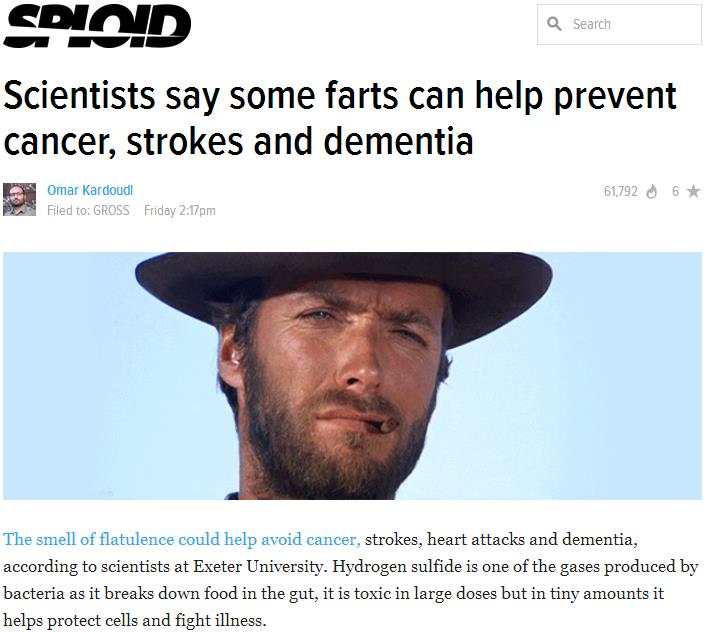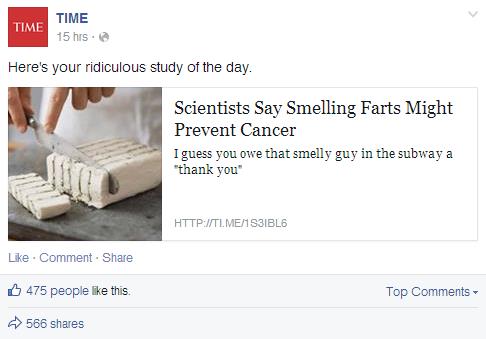[FACT OR FAKE #62] Is It True That Smelling Farts Could Help Prevent Cancer?
Cancer research scientists at the University of Exeter are suggesting that the smell of fart might actually be beneficial in terms of reducing a person’s risk of cancer and other chronic illnesses.
On 11 July 2014, TIME along with Gizmodo, DailyMail and CNET ran a study by University of Exeter stating that "smelling farts would actually prevent cancer, among other diseases"
Here's what TIME reported:
"Although the stinky gas can be noxious in large doses, the researchers seem to think that a whiff here and there has the power to reduce risks of cancer, strokes, heart attacks, arthritis, and dementia by preserving mitochondria. Researchers are even coming up with their own compound to emulate the stinky smell’s health benefits."
Within hours of publishing, the story went viral, garnering hundreds of thousands of Facebook Likes and shares
In other words, people were excited to smell farts and prevent cancer along with strokes and dementia
So is it true that smelling farts can actually prevent cancer among other diseases? How much of this study is FACT OR FAKE?
On another note, farts have been clocked at the speed of 10 feet per seconds
Image via iloveuselessknowledge.comFAKE: The study stemmed from some research on hydrogen sulfide's effect on mitochondria — NOT cancer, NOT farts, NOT people smelling farts. In other words, false science went viral.
The mitochondrion is a membrane-bound organelle found in most eukaryotic cells (the cells that make up plants, animals, fungi, and many other forms of life). Mitochondria range from 0.5 to 1.0 micrometer in diameter. These structures are sometimes described as "cellular power plants" because they generate most of the cell's supply of adenosine triphosphate (ATP), used as a source of chemical energy. In addition to supplying cellular energy, mitochondria are involved in other tasks such as signaling, cellular differentiation, cell death, as well as the control of the cell cycle and cell growth.
The study is called "The synthesis and functional evaluation of a mitochondria-targeted hydrogen sulfide donor, (10-oxo-10-(4-(3-thioxo-3H-1,2-dithiol-5-yl)phenoxy)decyl) triphenylphosphonium bromide (AP39)" and was recently published in the Medicinal Chemistry Communications journal
According to the researcher's findings, hydrogen sulfide is naturally produced by our body and may be a part of a compound (AP39) that helps strengthen mitochondria, our body's "powerhouse" of cells, which drive energy production in blood vessel cells and help fight certain diseases. The purpose of the study was to see how much that compound could actually help combat this diseases.
However, the findings don't go anywhere as far as claiming smelling farts prevents cancer. The university's press release was slightly misleading by titling itself "Rotten Egg Gas Holds Key to Healthcare Therapies," and the study isn't exactly explained clearly.
The story was also picked up by several smaller publications, which mostly based their stories off a university press release and one golden quote from Dr. Mark Wood of Biosciences, at the University of Exeter:
"Although hydrogen sulfide is well known as a pungent, foul-smelling gas in rotten eggs and flatulence, it is naturally produced in the body and could in fact be a healthcare hero with significant implications for future therapies for a variety of diseases."





